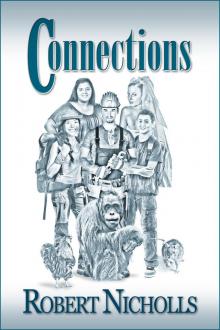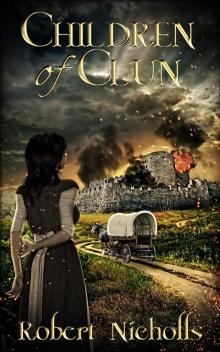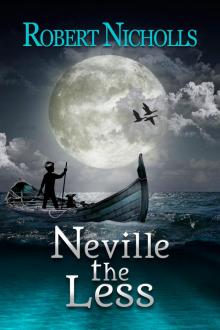- Home
- Robert Nicholls
Children of Clun
Children of Clun Read online
Children of Clun
Robert Nicholls
Copyright 2013 by Robert Nicholls
Table of Contents
Chapter 1 – Questions
Chapter 2 – Left Behind
Chapter 3 – Taking Action
Chapter 4 – Forest and Hall
Chapter 5 – Into the Darkness
Chapter 6 - Night Sounds
Chapter 7 – What the Wind Discovered
Chapter 8 – Into the Forest
Chapter 9 – Locked In
Chapter 10 – The Scottish Connection
Chapter 11 – Under Attack
Chapter 12 – Rescue
Chapter 13 – Mary Gordon
Chapter 14 – Sir Roland’s Decisions
Chapter 15 – Tom the Sharpener
Chapter 16 – Sir Cyril’s Gaff
Chapter 17 - Owain Glyndwr
Chapter 18 – Brother Bones
Chapter 19 – Susan the Spy
Chapter 20 – Roland’s Challenge
Chapter 21 – Maude Meets the Nobility
Chapter 22 – Madeleine and Anwen at Large
Chapter 23 – Homecoming
Chapter 24 – Maude’s New Position
Chapter 25 – Unexpected Shelter
Chapter 26 – Roland Prepared
Chapter 27 – Revelations
Chapter 28 – The Children of Owain
Chapter 29 – The Importance of Sisters
Chapter 30 – October 31
Chapter 31 – The Night is Young
Chapter 32 – Struggles Within
Chapter 33 – Struggles Without
Chapter 34 – Escapes: Successful and Unsuccessful
Chapter 35 – Negotiations
Chapter 36 – Crossed by Fate
Chapter 37 – Myfanwy
Chapter 38 – Madeleine, Marie and Lady Joan
Chapter 39 – Roger, Joan and Samuel Rowe
Chapter 40 – All Saints’ Day
Chapter 41 – Answers
About the History
About the Novel
Children of Clun
Chapter 1 – Questions
“More’n what? More’n an ‘usband? More’n a family o’ your own?” Gwilym put his fists on his hips and loomed like a loose hillside over his daughter. “What do ye mean, ‘more’?”
“No, not ‘more’! I didn’ mean ‘more’!” Madeleine’s voice cracked, rippled and threatened to break, but she refused to look away. It had taken her all day to work up the courage to speak to him. “I meant . . . ‘else’! Something ‘else’!”
Gwilym, half turning his head, glared down on her, like a rooster eyeing a beetle.
“Else? And what ‘else’ d’ye think there might be for the likes o’ you, uh?”
The ‘uh’ was sharp and accusatory, revealling a world of impatience and Madeleine knuckled away at one eye, keeping the other locked on his face. She knew both the tone and the impatience well, but there was no danger of her crying. She never cried.
“Ye don’t even care what I want, do ye? Only what you want! Ye never listen, ‘cause ye’r scared ye might have to do somethin’ different! Somethin’ might have to change! An’ that’d never do, would it!”
“Change! Change to what?” Gwilym demanded. “I’m askin’ ye! De ye know yerself what it is ye want? If ye do, tell me! Go on! Tell me!”
It was the demand she’d dreaded. Some kind of sense of what she was for in the world; what the world was for! That’s what she wanted. To know that there would be a real life – a Madeleine life – for her, somewhere, sometime! It hardly made sense, even to her! How, then, could she explain it to Gwilym!
“No! Ye can’t tell me, can ye? I’m standin’ ‘ere, like a flea on a sow’s ear, wastin’ me valu’ble time . . . again . . . listenin’ to the endless moanin’ an’ complainin’ of a sour little girl! Wi’ ambitions above ‘er station! It’s e-bloody-nuff, ye stupid girl! Ye hear? I’m yer father! It’s my job to tell ye what ye want . . . an’ more important, what ye can get! Ye should shut yer mouth an’ be grateful fer small mercies!”
“What I can get?” Madeleine cried. “I’d rather get nothin’ than get one o’ your snotty little shite-shovelers! I’d rather never marry! At all! Ever!”
She was aware that she was screeching but what could she do? The force required to get those words out was way beyond the volume of reason.
Gwilym reacted with a jerk of his head, as though a wasp had flown up his nose. For a critical moment, he was too stunned to speak. Madeleine knew the risk of provoking such outrage in her father; knew that the shortness of his temper and the quickness of his hands were legendary in the village. When he falls quiet (people were inclined to remind one another) it’s best to do the same. Shut your mouth and move away. He fell quiet now, but Madeleine didn’t move away. She’d already considered and dismissed all the possibilities. Never ask – never get, she’d told herself. She blazed away at him.
“What if me whole life passes ‘ere?” She had no arguments – only questions. But in her mind they were huge and crippling questions – like boils on an already broken limb. “What if it all passes ‘ere, in this village? Nothin’ we do ‘ere matters to anyone, anywhere! An’ it’s never gonna change! We live, we ‘ave babies, we die! That’s all we get to know! I hate this place! I hate this family! I hate you!” Ahh! She had never before pushed so far. But then, she’d never been so desperate, either. So let things fall as they may.
* * * *
The ‘here’ that she was talking about was her home village of Clun. Madeleine herself couldn’t have described very well where Clun was – in the Welsh Marches, she’d have said – in Shropshire – beside the river – next to the castle. In the middle of the forest. The town of Ludlow was somewhere nearby – and Bishop’s Castle – and Much Wenlock. But she’d never been to any of them. London – the great and fabulous city of London – where his royal majesty King Henry the Fifth of England lived, was in an entirely different world. Farther, probably, than the moon. At least the moon could be seen from Clun.
And what was it like? In the year of our Lord 1421, Clun was a place occupied almost solely by farming folk – peasants – villeins – like Madeleine’s family. People whose lives were devoted to, and used up in, the service of nobler classes. People whose lives had always been (so long as anyone could remember) as indistinguishable and undistinguished as spit in a thunderstorm. The world of a sixteen-year old girl from Clun was like an acorn on a twig at the end of a long, long, branch. It was like a drop of water on the dry side of a hill, with all the streams flowing away from some other valley.
* * * *
Madeleine didn’t get hit. But her father did walk away. Red-faced, muttering and spluttering, he banged through the door and into the house.
“Why was I cursed wi’ daughters?” he demanded of his wife. “Were it your plan to make me miserable?”
Gwenith had heard the complaint too often to offer an answer and Gwilym had made it too often to expect one. Sixteen years on the same argument – begun the day Madeleine was born – had made it so familiar that it was almost like a fourth child – the brother their three girls never had. The argument sat at table with them, woke them in the night and demanded to be picked up at the slightest provocation.
“Did ye hear?” he ranted as he stormed through the room. “Did ye hear what she said?” Gwenith wagged her head, sadly non-committal, and toed an unburnt faggot into the fire. She’d heard it all. Many times.
A moment later, he crashed back through the room, pushing the twins before him. Maude and Anwen, at fifteen years – one year younger than Madeleine – had so far escaped the pressure to marry. In fact, it seemed to Madeleine, they’d escaped a lot of things. But it w
as clear they weren’t going to escape the wrath she’d inspired in Gwilym this day.
He shook the two girls as though shaking the fleas off a pair of dogs and stood them shoulder to shoulder. For twins, they were oddly unalike. In fact, all three girls were strangely mismatched. Madeleine, though a year older, was half a head shorter than her sisters. Madeleine’s hair was black, heavy and kinked, like the fleece off a dark lamb. Anwen’s was blond and fly-away while Maude’s red hair was straight and hung in ropy strands across her face.
Their natures were also deeply contrasting and yet, for differing reasons, all were poor fits in the larger family of the village. Madeleine, people said, was too much like her father; too angry, too disdainful, too discontented – tolerable traits in a man but so unattractive and useless in a girl that, at sixteen, she was beginning to seem like a loser in the marriage stakes. Gwilym was doing his best, but pressuring her was like scratching at a scab – the time was never right. Nonetheless, he felt it his job to keep peeking – to see if the ragged bits had yet been replaced by smooth, new, never-before-seen flesh.
Maude, in total contrast to Madeleine, was shy and reticent – so timid that she’d ask the goat’s permission before milking it. And worse, her alarmingly red hair marked her, for many, as a harbinger of bad luck – sufficient, if met early in the morning, to send grown men straight back home to bed! No one was surprised when she woke the village with haunted cries, or spooked people by speaking while walking alone in the fields. All in all, people had concluded, Maude was one of the ‘marked’ ones God sometimes sends for reasons of his own. Best avoided.
And different yet again, was Anwen. Joyous and fearless, Anwen was a worrisome gift to the village – the one who skinny-dipped openly in the river while her sisters sat on the bank, guarding her clothes and shooing away the twittering, peeping boys. Her, Gwilym could have married off to any of a dozen goggle-eyed, smitten suitors, if only their parents would permit it. But, “She’ll end badly,” parents insisted to their sons, “and so will anyone who hooks up with her.”
In the past year, no wishing stone in the village had escaped being thrown at least once over Gwilym’s shoulder. Please let my daughters find their places in the world! Please make Madeleine see her way clear to . . . just understanding . . . accepting . . . the way the world is! Please let Maude be. . . he didn’t know what. Less queer? More useful? And Anwen! Please! Let her learn to take something, anything, seriously! With all three ranged before him, he waved a rod-like finger in their faces.
* * * *
“Not a peep out o’ yez!” His voice had fallen to a dangerous level. “Not a peep! ‘Cause I’m fed up to the back teeth wi’ the arguments! An’ I’m this close to washin’ me ‘ands o’ the lot o’ youse! Understand? Now I don’t know what ‘else’ any o’ ye think there is, but I’m about to tell ye the God’s own truth! Life is work! Understand? For the likes o’ you an’ me an’ our family, life is duty and work! That’s it! That’s the lot! Yer duty is to marry exactly who I say, exactly when I say! It’s to have ungrateful little sprogs, just like yourselves, an’ to work for your ‘usbands an’ your families and the Lords o’ Clun! Whoever they happen to be! That’s the world as it is! That’s the world as it’s always been, all the way back to when Eve was nowt but a rib in Adam’s chest!” He paused for sarcastic emphasis, leaning close to Madeleine’s face. “Poor specimens that even they would o’ been in this one’s eyes! Now! Is there any part o’ that that’s not clear as rubies in yer ‘eads?
Anwen shook her head vigorously, her eyes wide with ‘I-would-never-think-to-question-you!’ innocence. Maude’s head tilted thoughtfully, her forehead wrinkled and she said, in her enigmatic way, “Some’at’s comin’!” Madeleine, his principle target, stood, rigid as a fencepost, her gaze fastened on the middle of his chest, refusing to acknowledge the question. If she couldn’t have answers, neither could he. None of the responses satisfied Gwilym.
“Then get yourselves outta me sight!” he stormed. “Or I’ll not be responsible! To bed wi’ the lot o’ youse!”
Madeleine knew – had always known – that her father would insist on his way in the end. But she’d had to try – had to hope. And so, with all the dignity she could muster, she led the way into the hut, thinking how its gloom matched her outlook perfectly. If her soul were a house, it would be just like this – cramped, with a dark, beaten earth floor, wattle and daub walls, a musty thatch of roof and a dank, charcoal smell of burning. She so wanted it to be a soaring place, like the Great Hall of the castle or the sunlit glory of the old stone church.
The front part of their house – the part with the fire pit – the part the girls were passing through – had been sectioned off and furnished with a plank table and bench. Often, folks from the village could be found there, resting, drinking and sharing stories. Occasionally travellers from the high road, drawn by the ale stake in front of the house, stopped to sample their mother’s brew, paying sometimes with copper pennies and sometimes with stories of the great world beyond the Marches. Indeed, it was in that very room that Madeleine’s hunger – for something even more nourishing than oatcakes and boiled turnips – had first been stirred.
This particular early evening, their mother, Gwenith, was the only one in the room. Wide and round, Gwenith was a woman of significance in Clun. She was valued for her brewing skills, she was respected as the wife of the reeve and she was pitied for being stuck with a family that would have driven Saint Milburga herself into despair.
Gwenith glanced reprovingly at the girls as they trudged through to the family’s sleeping room. But she said nothing. Gwilym was the master of the house. In fact, as reeve, he was pretty much master of the village, responsible for organising the work on the lord’s land and keeping tally of the produce. He was a man of substance and Gwenith was proud of him – proud of his skill and determination and the respect that he’d earned in the village. A good man! But an intractable one who knew no other way than his own.
At the same time, Gwenith was proud of her girls – proud of their health and their strength. Perhaps just a little worried about their . . . uniqueness. But she fully believed that, when the need arose in their lives, their characters would suffice. After all, there’d been a time – a time before Gwilym – when she’d also had her dreams.
* * * *
In the sleeping room, the girls lay down on their straw pallets. Each was still, in her own thoughts, for long moments. Then Anwen rolled up close behind Madeleine and placed an arm around her. “Do you really hate us all, Maddie?”
She followed the question with a series of sniffles and hiccups but Madeleine simply gritted her teeth and closed her eyes. Anwen stroked and patted Madeleine’s hair. “We’re not so bad, Maddie!” she whispered. “We’re not so bad! Are we?”
Maude knew she should say something, but she didn’t know what. She had reason of her own to know how confused and frightened people could be. She said what came into her head. “It ain’ gonna be like he said – ‘good enough’. Somethin’s comin’. Somethin’s changin’.”
* * * *
All the family slept in this room – in the winter, with the goat and the pig and a couple of sheep for extra warmth. But this was still, for one glorious day at a time, summer. The goat and the pig were tied up outside and the sheep had been left to graze on the common. Even though it was well into October! People had begun to wonder if old man winter had fallen off a bridge and drowned.
Maude and Anwen gradually drifted off to sleep, but Madeleine refused to give in. She would wait, she promised herself, and listen until her parents came in and also fell asleep. Then she’d creep away into the warm solitude of the night – down to the bridge where, in rare, stolen moments, she liked to lean out over the swirling waters. The Clun River wasn’t terribly deep or wide, but there were trout in it. And grayling. Fish that could swim, if they chose, to bigger and bigger waters until they reached the sea. And what a feeling that must be!
T
here was a saying that anyone who crossed the bridge at Clun would come back a wiser person. Madeleine had run across it many times, hoping to come back with a clearer understanding of the hopeless feeling that had taken root in her chest. This night, though, her determination failed her and she fell asleep, dreaming of that old bridge and its unaccountable silence.
Perhaps the bridge was confused about which sister was asking. Or perhaps the dreams that Madeleine dreamed simply warranted less attention than did Maude’s. Because this October night, Maude was also dreaming of the little stone arch. In her dream she saw a cart, drawn by a pony, come click clacking across from the direction of Wales. In the dream, she and Madeleine were standing, waiting, on the Clun side. She looked about for Anwen, but Anwen wasn’t there. Then she tried to drag Madeleine away because something in the dream told her that, once the cart arrived, if it stopped, it would pick up Madeleine and take her away forever.
A sharp edge of panic came close to nudging her awake, causing a fox, sniffing beyond the hut’s wall, to cringe and slink away, alarmed by her sleeping cry. But then, a warm, soothing hand seemed to touch her mind. The panic subsided and she settled back into a soupy, dreamless, nourishing sleep.
Chapter 2 – Left Behind
By habit, Gwilym, Gwenith and the sun all rose together. The girls would wait just long enough for those three to get well about their business before crawling out from under their woollen covers. All over the village, people would be relieving themselves on the middens at the backs of houses or in the fields. They’d be taking up a few cold oatcakes, maybe an apple, having a sip of water or ale and going out to work the fields. Only by working every day could they be remotely certain that there’d be food to eat through the winter.
Gwenith’s task for this October morning would be to continue tending the new mash as it cooked. Gwilym must gird himself for yet another argument – this time at the castle. He had been summoned by the steward, Samuel Rowe, to talk about provisions.
Maude, he’d decided, would go with him. “Ye’ll not be talkin’! Do ye understand? I’ve business on me mind! I jus’ might need ye for messagin’ is all.”
Maude rarely had much to say but Gwilym had long been aware that her company – her placid temperament – seemed able to clarify a troubled mind. Perhaps, when the business with Rowe was done, her presence would help him collect his thoughts. Help him decide what more could be done with his wayward daughters.

 Connections
Connections Children of Clun
Children of Clun Neville the Less
Neville the Less Sugar Town
Sugar Town